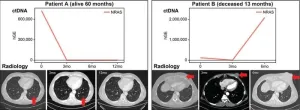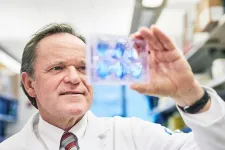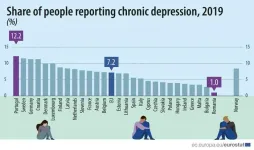(Press-News.org) At this year’s Annual Meeting of the European Association for the Study of Diabetes (EASD) in Hamburg, Germany (2-6 Oct) experts will discuss if lasting remission from diabetes is feasible in the real-world setting.
Professor Roy Taylor of Newcastle University, Newcastle, UK, will be speaking in support of the motion
Professor Taylor will argue that through a series of studies in which people with type 2 diabetes were put on low calorie diets, he has shown that lasting remission of type 2 diabetes is indeed feasible in the real world.
He will begin the overview of his research by describing the Counterpoint study which, in 2011, established that it is possible to reverse type 2 diabetes by following a very low calorie diet.1
It also showed that type 2 diabetes is caused by excess fat in the liver and pancreas and loss of this intra-organ fat is key to remission.
Counterpoint was, however, a short proof-of-concept study and a further study was needed to demonstrate that the return to normal lasted beyond the low-calorie diet phase.
In 2016 the Counterbalance study, 30 people with type 2 diabetes followed a very low calorie diet (800 calories a day from shakes and soups) for eight weeks before returning to normal eating.
This demonstrated that if weight loss is maintained, type 2 diabetes can be reversed for at least six months.2
However, both of the studies were conducted in a research centre and it was important to establish whether type 2 diabetes could be reversed in primary care, where it is routinely managed.
The DiRECT trial, which was delivered by GP practices and coordinated between Newcastle and Glasgow, was designed to answer this question. 298 people with type 2 diabetes participated in this randomised controlled trial, which involved 12 weeks on a very low calorie diet, followed by weight-loss maintenance support.
Professor Taylor says: “In 2018 this ground-breaking study showed that it is possible to obtain remission from type 2 diabetes through a dietary intervention in primary care.
“At 1 year, the intervention group were 10 kg (22lb) lighter, on average, than at baseline and almost half (46%) were in remission from diabetes – they were off all glucose-lowering drugs. At 2 years, they were still 8.8kg (19.4lb) lighter than at baseline and 36% were in remission.3
“We then extended the study for a further three years to investigate the longer-term benefits of the programme. Participants in the extension study received nurse or dietitian appointments at their GP surgery every three months, during which they were offered advice on maintaining their weight loss.
“Those who were most successful in avoiding weight regain remained in remission. After five years, they were still 8.9kg (19.6lb) below baseline and were still in remission. However, this was only 23% of those who were in remission at 2 years, as the intervention group as a whole had regained some weight.
“The message here is that only those who can keep the weight off stay in remission – and that it is certain that type 2 diabetes will return in those who return to their original weight.”
Professor Taylor’s body of work has also established the underlying cause of type 2 diabetes – and the biology of remission.
He has shown that excess fat in the liver prevents insulin from working properly. It also increases the normal process of export of fat to the body’s tissues, including the pancreas, where it stops the insulin-producing beta cells from working properly.
Weight regain causes the return of increased liver fat, increased fat export from the liver and a decline in beta cell function.
The DiRECT results have inspired a national remission programme in England4, in which a very low calorie diet is used to promote weight loss and so the reversal of type 2 diabetes.
Early results from NHS England’s Type 2 Diabetes Path to Remission programme show 10.3kg (22.1lb) weight loss at 12 months, which is on a par with the DiRECT trial.
Professor Taylor says: “It is therefore clear that the necessary weight loss to achieve remission of type 2 diabetes is feasible in the real world – and this leads to lasting remission provided that sufficient support is provided to avoid weight regain.
“Avoiding weight regain is challenging but it is possible and it can lead to long-lasting remission.”
References:
1. https://pubmed.ncbi.nlm.nih.gov/21656330/
2. https://pubmed.ncbi.nlm.nih.gov/26628414/
3. https://www.thelancet.com/journals/landia/article/PIIS2213-8587(19)30068-3/fulltext
4.https://www.england.nhs.uk/diabetes/treatment-care/diabetes-remission/
Professor Kamlesh Khunti, of the University of Leicester, Leicester UK will speak against the motion
Professor Khunti will argue that lasting remission of type 2 diabetes is not feasible in the real world. He will use evidence from studies on lifestyle interventions, including low calorie diets, GLP-1 receptor agonists and bariatric surgery to explain why.
He will explain that remission through lifestyle interventions, including low calorie diets, has been tested in a number of studies but these have shown that behaviour change is difficult to maintain long term.
This includes the DiRECT trial, which is often cited as evidence that weight loss achieved through a low calorie diet can put type 2 diabetes into remission. However, at five years, DiRECT reported data on only 53 people with sustained remission, which is approximately 7% of those who were initially randomised to the low calorie diet.
“The cost effectiveness analysis of the DiRECT study is also questionable,” says Professor Khunti.
“Other studies have shown that weight lost through lifestyle changes is eventually regained. Changes in circulating hormone levels increase appetite, encouraging weight regain.
“Weight regain also results in collateral fattening – where some of the muscle mass that was lost is replaced by fat.
“In addition, studies haven’t shown that low calorie diets reduce the risk of microvascular complications of diabetes, such as retinopathy and neuropathy, nor the risk macrovascular complications, such as coronary artery disease.”
Another key issue is the definition of remission. The most current definition by the American Diabetes Association, EASD and Diabetes UK defines remission as an HbA1c < 6.5% for three months after cessation of glucose-lowering therapies. Unfortunately, the results of most interventions fail to satisfy this definition.
For example, GLP1-receptor agonists, a family of drugs that are used to treat type 2 diabetes and obesity, have demonstrated remarkable results in terms of reversing type 2 diabetes.
Striking as these results are, they would not be classed as remission by the current definition as the participants were not able to stop taking glucose-lowering medication.
The most compelling data for long-term remission comes from bariatric or weight loss surgery, where almost a third of people are still in remission after 15 years.1
“Metabolic surgery has also demonstrated microvascular and macrovascular benefits. This is also the case for GLP-1 receptor agonists,” says Professor Khunti. “However, bariatric surgery is quite a drastic procedure and is not practical for the whole population. It is also associated with severe adverse events, some of which can be fatal.
“In summary, lasting remission is not possible in the real-world setting – at least with the current definition of remission. Perhaps it is time to think about the terminology; with a definition such as possibly ‘remission of hyperglycaemia with or without glucose-lowering therapy’, remission would be more achievable for more people in the real world.”
References:
1. https://pubmed.ncbi.nlm.nih.gov/24915261/
END
Is lasting remission of type 2 diabetes feasible in the real-world setting?
2023-10-05
ELSE PRESS RELEASES FROM THIS DATE:
Second international consensus report - clinical translation of precision diabetes medicine
2023-10-05
Precision medicine is part of the logical evolution of contemporary evidence-based medicine that seeks to reduce errors and optimise outcomes when making medical decisions and health recommendations. Diabetes affects hundreds of millions of people worldwide, many of whom will develop life-threatening complications and die prematurely.
“Diabetes recommendations often focus on what works well for the average person. However, because diabetes is an incredibly heterogeneous disease, few people are Mr or Mrs “average” and one-size-fits-all ...
Wastewater surveillance research provides a 12-day lead time for RSV season: new study
2023-10-04
In a first-of-its-kind study, researchers using wastewater surveillance over conventional indicators have predicted the start of the annual respiratory syncytial virus (RSV) season 12 days early, providing more lead time for hospital preparedness and the timely initiation of RSV prevention therapy provided by the province for at risk-infants and young children.
Published in Frontiers in Public Health, the study is the first to describe the relationship between wastewater measurements and clinical data for RSV and to use near real-time wastewater measurements to accurately identify the start of the RSV season.
Working in close collaboration with CHEO Research Institute (RI) ...
Unmet health needs for HIV, hypertension and diabetes in rural South Africa
2023-10-04
The burden of non-communicable diseases like hypertension and diabetes is increasing globally, especially in low-income and middle-income countries where they occur alongside epidemics of communicable diseases like HIV. A large public health survey in South Africa led by Emily Wong, M.D., has assessed the multimorbidity health needs of individuals and communities in rural KwaZulu-Natal and established a framework to quantify met and unmet health needs for individuals living with infectious and non-communicable diseases. The study is published in The Lancet Global Health.
“Applying ...
Blood-based biomarker may redefine the future treatment for advanced melanoma
2023-10-04
Circulating tumor DNA (ctDNA) is emerging as a blood-based biomarker for many solid tumor types, including melanoma. A new study that assessed ctDNA in the blood of patients with BRAF wild-type (BRAF WT) stage III and IV melanoma concludes that measuring ctDNA may lead to alternative treatment options and better outcomes for these patients, report investigators in The Journal of Molecular Diagnostics, published by Elsevier.
For patients with BRAF WT stage III and IV melanoma, there is an urgent clinical need to identify prognostic biomarkers and biomarkers to predict treatment ...
Advances from MSK researchers reported at 2023 ASTRO Meeting
2023-10-04
Researchers from Memorial Sloan Kettering Cancer Center (MSK) were recognized for their achievements at the 2023 meeting of ASTRO, the American Society for Therapeutic Radiology and Oncology. Teams reported new findings about radiation-induced secondary cancers, a new guidance system for radiation therapy, and the consequences of insurance denials, among other topics.
At the meeting, held from October 1 to October 4, 2023, in San Diego, Simon Powell, MD, PhD, FRCP, Chair of MSK’s Department of Radiation Oncology and Enid A. Haupt Chair in Radiation Oncology, was honored with ASTRO’s Gold Medal Award. This award is ASTRO’s highest honor, bestowed upon ...
Ketamine-related drug gives better treatment for difficult to treat clinical depression
2023-10-04
Type of work: peer-reviewed/clinical trial/people
A major clinical trial shows that the drug, esketamine, one of the two main forms of ketamine, outperforms one of the standard treatments for treatment-resistant major depression. This industry-funded work is presented for the first time at the 36th ECNP Congress in Barcelona, with publication in the peer-reviewed journal the New England Journal of Medicine (see Notes for details).
Clinical depression (also known as MDD, major depressive disorder) affects a significant number of people at any one time, giving ...
Esketamine nasal spray: an option for patients with treatment-resistant depression
2023-10-04
Understanding Treatment-Resistant Depression
Treatment-resistant depression (TRD) is a particularly challenging form of major depressive disorder. As Albino Oliveira-Maia, head of the Champalimaud Foundation’s Neuropsychiatry Unit and the study’s national coordinator for Portugal, explains, “TRD is defined as the persistence of depressive symptoms despite adequate courses of at least two different antidepressant medications”. Despite repeated therapeutic attempts, these patients’ depressive symptoms ...
Navigating moiré physics and photonics with band offset tuning
2023-10-04
When two lattices with distinct angles or periodicities come together, they conjure a moiré superlattice — a realm where astonishing phenomena like superconductivity and optical solitons spring to life. At the heart of this realm lies the moiré flatband, a key player in shaping advanced light–matter interactions, such as laser emission and second harmonic generation. In moiré physics and its relevant applications, wielding control over flatbands is a pivotal superpower.
Moiré flatbands are typically generated with special structures, often manipulated ...
Aging in place: U-M study highlights racial disparities among older adults
2023-10-04
Audio
Roughly 40% of older Black adults live with a disability, compared to only one-third of older adults overall.
Disability is one of various disparities highlighted in a new study from the University of Michigan, which used data from the National Poll on Healthy Aging to examine the extent to which 50- to 80-year-olds were prepared to age in place and the racial and ethnic disparities that exist to that end.
Sheria Robinson-Lane, U-M assistant professor of nursing and principal investigator, said many of the disparities were related to "weathering"—stressors connected to environmental, ...
U.S. drinking water often contains toxic contaminants, UNM scientist warns
2023-10-04
Most Americans take it for granted that the water that comes out of their taps is clean and safe to drink.
But a new study published by a University of New Mexico scientist with colleagues from across the U.S. warns that water from many wells and community water systems contains unsafe levels of toxic contaminants, exposing millions to health risks, including cancer.
The review in the Journal of Exposure Science and Environmental Epidemiology also finds that people living on tribal lands or ...





